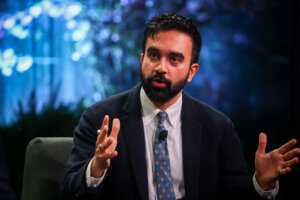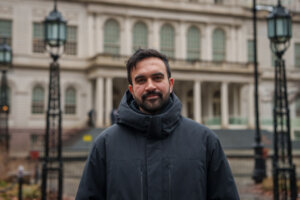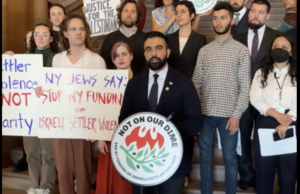What a Mayor Mamdani would mean for New York Jews
Zohran Mamdani’s victory upends decades of traditional Jewish outreach and Israel trips

New York City mayoral candidate Zohran Mamdani on June 24. Photo by Michael M. Santiago/Getty Images
New York’s Jewish community, online and off, is preoccupied with Zohran Mamdani’s stunning upset in New York City’s Democratic mayoral primary: What would his history of activism against Israel mean should he become mayor? Did the Jews who voted for him consider above all his plans for social relief?
The 33-year-old Democratic Socialist is a vocal critic of Israel and aligned with progressive causes. His potential victory over incumbent Mayor Eric Adams in the general election is raising questions not only about his stance on Israel, but also about how he would govern a city with the largest Jewish population outside of Israel.
During the campaign, Mamdani did not shy away from controversies, Jewish and otherwise. He said he would not visit Israel, breaking with a tradition upheld by mayors since 1951 to show solidarity with the fledgling nation and with Jewish constituents at home. He is the first Democratic nominee to pledge to publicly back the movement to boycott Israel as mayor, which some in the pro-Israel community see as an assault on the legitimacy of the Jewish state’s existence — and some even say is antisemitic.
Mamdani, who is Muslim, also came under fire for declining to co-sponsor resolutions recognizing Israel’s independence and commemorating the Holocaust. Jewish colleagues in the state house accused Mamdani of antisemitism after he authored a bill to penalize charities supporting Israeli settlements. His critics said it targeted, in part, Jewish organizations and nonprofits assisting families of terror victims or providing support for units of the Israel Defense Forces.
Mamdani was less connected to the broader Jewish community than other candidates in the race — Brad Lander and Scott Stringer, who are Jewish, and his closest rival, former Gov. Andrew Cuomo, who aggressively courted pro-Israel and Orthodox groups.
Mamdani has nevertheless appealed to Jewish voters who prioritize local issues such as eldercare, paid family leave, affordable housing and combating discrimination, according to a Siena Research survey. In an interview with a Yiddish-language Hasidic newspaper, Mamdani said he feels connected to the pain of observant Jews amid rising antisemitic violence and wants to better understand their needs and traditions.
Mamdani, in his victory speech on Tuesday night, sought to ease tensions with Jewish voters.
“I hope now that this primary has come to an end, I can introduce myself once more,” he said, alluding to attack ads that labeled him a threat to the Jewish community. “I promise that you will not always agree with me, but I will never hide from you. If you are hurting, I will try to heal. If you feel misunderstood, I will strive to understand. Your concerns will always be mine.”
Professor Ester Fuchs, director of the urban and social policy program at Columbia University’s School of International and Public Affairs, said Mamdani has an opportunity “to demonstrate that Muslims and Jews can work together constructively to make our city a better place for everyone.”
Can progressive politics and Orthodox priorities find common ground?

Mamdani will likely find some common ground with the Orthodox community, even though it leans conservative on social issues. One of his campaign aides, Ali Najmi, said on election night that Mamdani would directly engage with the Hasidic sects that endorsed Andrew Cuomo as their first choice.
There is room for such outreach. Zellnor Myrie, one of the nine leading candidates in the crowded primary, detailed in a memo to Orthodox leaders his plans to address affordable housing, taxes, education and public safety as key issues that “community leaders have brought to my attention.”
Mamdani pledged a rent freeze on rent-stabilized units, supports a broad range of social welfare initiatives, including universal child care, tuition-free public college and fare-free public transit. On private education, Mamdani presented himself as an ally to Hasidic yeshivas facing scrutiny for failing to meet state education standards. “The issue of your education is something I will listen to your leaders,” Mamdani told Satmar leaders. “I will work to protect you from anyone who wants to disturb your way of life.”
Former Mayor Bill de Blasio, a progressive who maintained strong relationships with Orthodox leaders during most of his two terms, said in an interview that he believes Mamdani has the temperament and values to foster dialogue on kitchen table issues.
“The community cares deeply about affordable housing, Section 8 [housing] vouchers, child care vouchers, good schools and safety, where the mayor can make a difference,” de Blasio said. “We don’t make foreign policy here. The job of the mayor is to take care of the everyday lives of people, and I think Mamdani fully understands it.”
Public safety and antisemitism

If elected mayor, Mamdani would take over a city grappling with rising antisemitism. Antisemitic incidents were up 18% in New York last year, with 68% of the 1,437 incidents occurring in New York City, according to the Anti-Defamation League. In the first quarter of 2025, New York Police Department data shows antisemitic acts made up 62% of all reported hate crimes citywide.
A recent poll of likely Jewish voters showed that 76% of respondents agreed that antisemitic hate crimes are a very serious problem, and that the city must do a better job protecting its Jewish residents.
Mamdani released a detailed plan to counter antisemitism, which includes the creation of a department of community safety and a commitment to increase funding for anti-hate crime programming by 800%. “Every New Yorker deserves to be safe. Every New Yorker needs to be protected,” Mamdani said in an April interview with the Forward.
Earlier this month, Adams signed an executive order adopting the International Holocaust Remembrance Alliance definition of antisemitism, which labels most forms of anti-Zionism as antisemitic. He also announced the creation of a new office to combat antisemitism. Mamdani has spoken out against the use of measures that he says silence Palestinian voices and their allies. All the Democratic mayoral hopefuls criticized Trump’s recent actions against top universities over his administration’s handling of pro-Palestinian campus protests.
Mamdani has been accused of engaging in antisemitism, attending some of the pro-Palestinian protests across the city just after Oct. 7 and defending the campus protests.
Audrey Sasson, executive director of the progressive Jews For Racial & Economic Justice, said she would feel safer as a Jewish New Yorker under a Mamdani administration. “I know of Zohran Mamdani as someone who is committed to everybody’s safety,” she said. “He takes hate crimes seriously.” JFREJ’s affiliated political organization, The Jewish Vote, endorsed Mamdani and Lander.
De Blasio also pushed back. “I have looked carefully; I don’t see any evidence of antisemitism in things that Zohran has said,” de Blasio said. “I don’t see any hateful comments about the Jewish people or any other people.”
Fuchs, who worked with the late New York City Mayor David Dinkins and in the Michael Bloomberg administration, said Mamdani will need to build trust with the Jewish community. “He needs to demonstrate and he needs to make clear that he understands how we need to protect every community in the city,” she said.
Israel and BDS

Mamdani’s record on Israel, including his support for the Boycott, Divestment and Sanctions movement against the country and a recent defense of the phrase “globalize the intifada,” sparked significant backlash. Mamdani co-founded the Students for Justice in Palestine group at Bowdoin College when he attended from 2010 to 2014,
He declined to recognize Israel specifically as a Jewish state and said he would refuse to visit the country as mayor. “I’m not comfortable supporting any state that has a hierarchy of citizenship on the basis of religion or anything else,” Mamdani said in a TV interview.
Mamdani indicated he would implement some form of Israel boycott as mayor, saying he would end some Adams administration policies he regarded as illegal, but did not go into detail. “International law is something that we should actually bring our city into compliance with,” he said during a candidate forum.
“At best Mamdani is insensitive to Jews and their concerns, at worst he harbors an antagonism to Jews,” Abe Foxman, the former head of the Anti-Defamation League, said. “As mayor he won’t be able to hold either position for long.”
A recent Emerson College poll found that 49 percent of Democrats said it was unimportant for the next mayor to have a pro-Israel stance.
In 2023, when Mamdani introduced his bill titled “Not on our dime!: Ending New York funding of Israeli settler violence act,” a majority of Democrats pushed back. Some called it “purely antisemitic” because it targeted, in part, Jewish organizations and nonprofits assisting families of terror victims. It would give the state attorney general the authority to revoke a charity’s tax-exempt status if violated.
Mamdani revived his push for the bill with the backing of Rep. Alexandria Ocasio-Cortez amid the war in Gaza. He said his target was several charities registered in New York “aiding and abetting” the resettling of Jewish communities in the Gaza Strip or providing “unauthorized” support for units of the IDF that international observers accuse of committing human rights violations. The bill has never been considered for a vote.
Mamdani has pledged to arrest Israeli Prime Minister Benjamin Netanyahu if he comes to New York in compliance with an International Criminal Court warrant. Netanyahu annually visits the city in September to attend the United Nations General Assembly. The United States is not a party to the ICC and the federal government would likely challenge the legitimacy of the arrest.

















